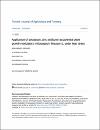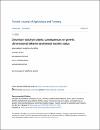Agricultural Research Station: المرسلات الحديثة
السجلات المعروضة 41 -- 60 من 71
-
Molecular Evidence of Breast Cancer Cell Proliferation Inhibition by a Combination of Selected Qatari Medicinal Plants Crude Extracts
( MDPI , 2023 , Article): Breast cancer (BC) is the most common malignancy, and conventional medicine has failed to establish efficient treatment modalities. Conventional medicine failed due to lack of knowledge of the mechanisms that underpin ... -
Promotive Role of 5-Aminolevulinic Acid or Salicylic Acid Combined with Citric Acid on Sunflower Growth by Regulating Manganese Absorption
( MDPI , 2023 , Article)Manganese (Mn) is an essential nutrient in most organisms. Establishing an effective regulatory system of Mn absorption is important for sustainable crop development. In this study, we selected sunflower as the model plant ... -
A robust field-based method to screen heat tolerance in wheat
( Elsevier , 2023 , Article)Wheat is highly sensitive to heat shocks and their timing. Hence, field-based ranking for heat tolerance may be confounded by phenological variations at the time of heat events. A photoperiod-extension method (PEM) was ... -
Improving Nitrogen Acquisition and Utilization Through Root Architecture Remodelling: Insight from Legumes
( Springer , 2023 , Article)In crop species, nutrient deficiency severely damages plant growth and developmental processes, leading to end-yield penalties. Root architecture remodelling is considered a key factor underpinning nutrient-poor soil ... -
Characteristics of historical precipitation for winter wheat cropping in the semi-arid and semi-humid area
( Frontiers Media , 2023 , Article)Winter wheat (Triticum aestivum L.) is one of major crops in the area along Huai river, China where it is a semi-arid and semi-humid region with sufficient precipitation for an entire season, but with uneven distribution ... -
Photodegradation and Its Effect on Plant Litter Decomposition in Terrestrial Ecosystems: A Systematic Review
( MDPI , 2023 , Article Review)Photodegradation is an important mechanism that affects carbon and nutrient cycling; a significant amount of data has been reported previously. The present review includes the effect of a wider spectrum of solar radiation ... -
An overview of heavy metals toxicity in plants, tolerance mechanism, and alleviation through lysine-chelation with micro-nutrients—A novel approach
( Springer , 2022 , Article Review)Abstract: Plants must adapt themselves to the prevailing conditions for their survival, resulting in the acquisition of a wide range of metal tolerance mechanisms. Although many metal elements are essential for the growth ... -
5-Aminolevulinic acid mitigates the chromium-induced changes in Helianthus annuus L. as revealed by plant defense system enhancement
( Elsevier , 2023 , Article)Chromium (Cr) in the soil is one of the major pollutants for agricultural production. This study examined the efficiency of sunflower plants to remediate Cr-contaminated soils using a plant growth regulator, 5-aminolevolinic ... -
Abrin inactivating mitochondrial ribosome induced anther abortion in cotton CMS line LD6A by damaging mitochondrial membrane structure
( Elsevier , 2023 , Article)Cytoplasmic male sterile (CMS) system has extensively been exploited for hybrid vigor in plant breeding programs. However, its application in many crops is limited due to poor understanding of molecular mechanism of fertility ... -
Proteomic analysis of T. qataranse exposed to lead (Pb) stress reveal new proteins with potential roles in Pb tolerance and detoxification mechanism
( Frontiers Media , 2022 , Article)Soil lead (Pb) contamination is one of the environmental problems facing the modern world. Sources of Pb in soil include industrial activities such as mining and smelting processes, agricultural activities such as application ... -
Functions and strategies for enhancing zinc availability in plants for sustainable agriculture
( Frontiers Media , 2022 , Article Review)Zinc (Zn), which is regarded as a crucial micronutrient for plants, and is considered to be a vital micronutrient for plants. Zn has a significant role in the biochemistry and metabolism of plants owing to its significance ... -
Principles and Applicability of Integrated Remediation Strategies for Heavy Metal Removal/Recovery from Contaminated Environments
( Springer , 2022 , Article)Contamination of agricultural soils with heavy metals present lethal consequences in terms of diverse ecological and environmental problems that entail entry of metal in food chain, soil deterioration, plant growth ... -
Efficient shoot regeneration of medicinal plant Haplophyllum tuberculatum by direct and indirect organogenesis and genetic fidelity assessment using Inter Simple Sequence Repeats markers
( Frontiers in Plant Science , 2022 , Article)In vitro plant cell and tissue cultures are potent tools to propagating germplasm resources in conserving and managing plant genetic resources. A reliable micropropagation protocol was developed for efficient callus ... -
Application of potassium, zinc and boron as potential plant growth modulators in Gossypium hirsutum L. under heat stress
( the Scientific and Technological Research Council of Turkey (TUBITAK) , 2022 , Article)High temperature stress at reproductive stages of cotton crop severely affects the yield and quality of cotton crop under changing climatic conditions. To alleviate the adverse effects of high temperature stress on cotton ... -
Chromium toxicity in plants: consequences on growth, chromosomal behavior and mineral nutrient status
( the Scientific and Technological Research Council of Turkey (TUBITAK) , 2022 , Article)Chromium (Cr) is a heavy metal of commercial importance; thus, significant amounts are released in wastewaters. The mobility and distribution of metals in the environment is related not only to their concentration but also ... -
Understanding the Phytoremediation Mechanisms of Potentially Toxic Elements: A Proteomic Overview of Recent Advances
( Frontiers Media , 2022 , Article Review)Potentially toxic elements (PTEs) such as cadmium (Cd), lead (Pb), chromium (Cr), and arsenic (As), polluting the environment, pose a significant risk and cause a wide array of adverse changes in plant physiology. Above ... -
Nickel Toxicity Interferes with NO3−/NH4+ Uptake and Nitrogen Metabolic Enzyme Activity in Rice (Oryza sativa L.)
( MDPI , 2022 , Article)The excessive use of nickel (Ni) in manufacturing and various industries has made Ni a serious pollutant in the past few decades. As a micronutrient, Ni is crucial for plant growth at low concentrations, but at higher ... -
Individual and Synergic Effects of Phosphorus and Gibberellic Acid on Organic Acids Exudation Pattern, Ultra-Structure of Chloroplast and Stress Response Gene Expression in Cu-Stressed Jute (Corchorus Capsularis L.)
( Springer , 2022 , Article)Copper (Cu) pollution in agricultural soils is considered as a serious health risk due to its accumulation in plants. Thus, there is an urgent need to optimize nutrient application for higher yield with lower Cu uptake to ... -
Silicon Enhances Morpho–Physio–Biochemical Responses in Arsenic Stressed Spinach (Spinacia oleracea L.) by Minimizing Its Uptake
( Springer , 2022 , Article)Soil contamination with toxic heavy metals [such as arsenic (As)] is becoming a serious global problem due to rapid development of social economy. Silicon (Si), being an important fertilizer element, has been found effective ... -
Zinc Oxide Nanoparticles and Their Biosynthesis: Overview
( MDPI , 2022 , Article Review)Zinc (Zn) is plant micronutrient, which is involved in many physiological functions, and an inadequate supply will reduce crop yields. Its deficiency is the widest spread micronutrient deficiency problem; almost all crops ...


















